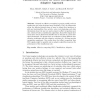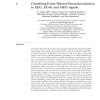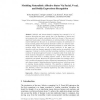70 search results - page 1 / 14 » Classification of EEG for Affect Recognition: An Adaptive Ap... |
AUSAI
2009
Springer
13 years 8 months ago
2009
Springer
Research on affective computing is growing rapidly and new applications are being developed more frequently. They use information about the affective/mental states of users to adap...
DAGM
2006
Springer
13 years 8 months ago
2006
Springer
We present the results from three motor-imagery-based Brain-Computer Interface experiments. Brain signals were recorded from 8 untrained subjects using EEG, 4 using ECoG and 10 us...
AIHC
2007
Springer
13 years 10 months ago
2007
Springer
Affective and human-centered computing have attracted a lot of attention during the past years, mainly due to the abundance of devices and environments able to exploit multimodal i...
ACII
2007
Springer
13 years 8 months ago
2007
Springer
In this paper we present a novel framework for analysing non-stylised motion in order to detect implicitly communicated affect. Our approach makes use of a segmentation technique w...
CVPR
2008
IEEE
14 years 6 months ago
2008
IEEE
Human-aided computing proposes using information measured directly from the human brain in order to perform useful tasks. In this paper, we extend this idea by fusing computer vis...



